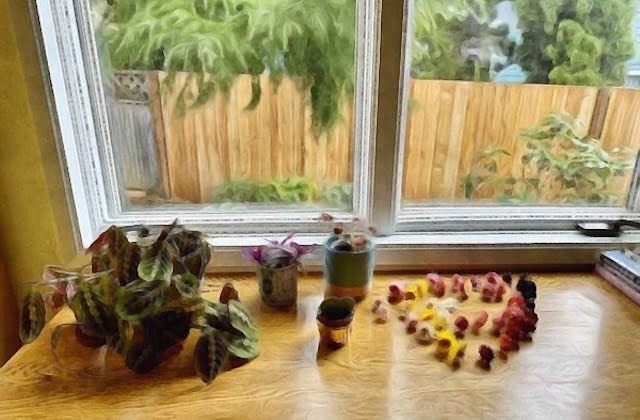
Helping It To Bloom
At the beginning of our many decades together, Tim and I were filled with both the appreciation of new love and the pain of power struggles.
Tim is an outdoor-loving country Kiwi who is most alive when climbing mountains, swimming in wild oceans, or digging in the garden. As the San Franciscan partner, I am happiest when dining at a fine restaurant, attending an exciting new play, or choosing perfectly manicured bouquets from a flower stand.
I harbored private judgments about Tim’s passion for gardening. His hours spent potting, selecting tools, and dissecting the endless “stuff” of worming fascinated and fed him, while I mostly saw his sore knees, the mud tracks through the house, and the stacks of zucchinis I begged others to take. As much as I love a garden in full bloom, I mostly considered Tim’s garden a source of dirt in our house and backbreaking labor as well as a drain on our time together. He wanted enthusiasm and appreciation for his efforts, but I felt annoyed about tripping over garden instruments. Our arguments about the garden led to arguments about many other ways we were different.
We each felt hard done by the other, and as empathy took a nosedive, we felt disrespected and unseen. Without trust and vulnerability, our emotional and intimate lives began to shut down.
So, we went to see Gert. She was the local guru among my psychotherapist colleagues. Well into her eighties and with a lifetime as a therapist behind her, she was the epitome of wisdom. She listened patiently and silently as we each put forth our positions, which were absolute and squared off against the other. Finally, we finished and awaited her arbitration. We expected her to point out which of us was being unreasonable or perhaps even wrong. But she simply said, “Do you want to be right, or do you want to be married?”
There were no long discussions about communication skills, questions about family of origin patterns, or compelling arguments about how each of us had valid points of view. Just that single question.
That was thirty-five years ago.
Her response seemed simplistic and offered little help, so that appointment was followed by years of seeing other therapists and attending classes and workshops on communication skills, nonviolent communication, and the family patterns that play out between partners. We learned how to mirror and make “I” statements, and we learned to understand the strengths and struggles of our different styles of being.
We slowly realized that different preferences were not right or wrong. We learned to be curious about the other’s perspective instead of trying to change their mind. Tim is an artist with watercolors, and I began to appreciate his garden as another palette for his artistic mind and heart. I thought about Gert and her simple response: “Do you want to be right, or do you want to be married?” How totally right she had been; her answer may have been simple, but it reflects the bottom line of relationship truth.
Someone recently asked me to identify the most common issue I see between partners. I would answer that in all relationships, the most common issue is not the first to appear. Partners may say something insensitive, forget a special day, do something thoughtless, or disagree about what to do on a vacation, making communication heated and difficult. That, however, is not the real issue. The real issue is what happens next. Do they move on, forgive, let it go, and appreciate that different preferences are not right or wrong? Do they focus on the things that work instead of those that don’t?
I have come to appreciate our beautiful garden with its flowers, trees, and plants. I still find worms creepy and muddy clothes and footprints in the house annoying. But I see now how happy the garden makes Tim, and that enhances my life immensely.
I thought I had developed supreme peace with, appreciation for, and acceptance of our differences, but yesterday, Tim sent me a photo of my beloved indoor plants on the windowsill that faces the outside garden. The spaces were perfectly complementary, and I found myself forced to admit that I too love gardening. I had been so focused on our differences that I had missed the beautiful symmetry of our connection.
